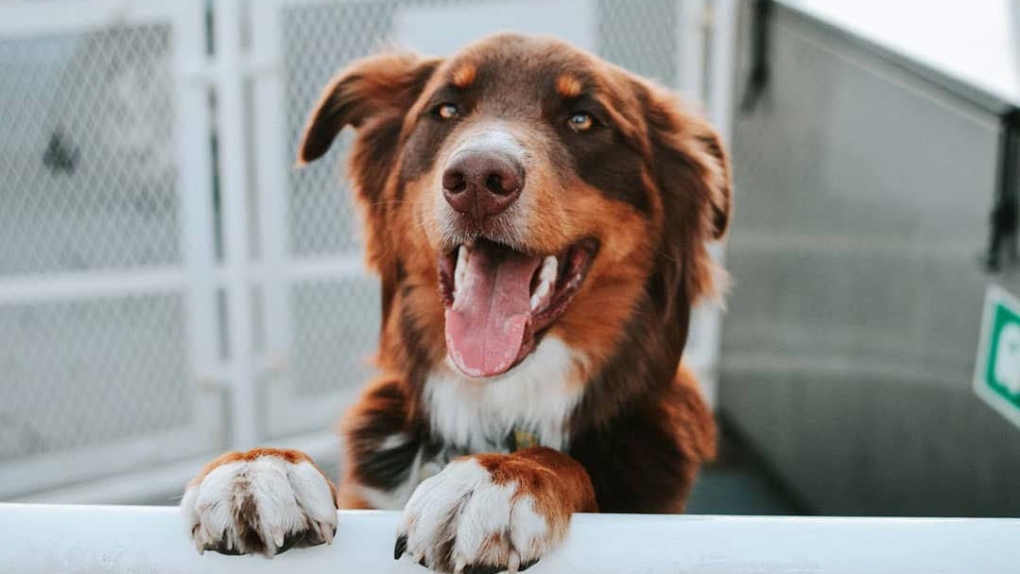This BC Ferries route will allow pets on outside decks under new pilot program
 (BC Ferries / Twitter)
(BC Ferries / Twitter)
BC Ferries is allowing passengers to take their pets onto outside upper decks under a new pilot program on one of its smaller routes.
Dogs and cats will be allowed on the Sunshine Coast (Earls Cove) – Powell River (Saltery Bay) route for the next three months under the pilot program.
The trial launched on Wednesday, and BC Ferries says it may extend the practice to other routes, pending "pawsitive" feedback from customers once the trial's over.
Dogs who are on the upper deck must be leashed, with each passenger only allowed to take a maximum of two dogs on deck.
Meanwhile, cats must be kept in a travel carrier at all times.
"Waste bags and water bowls will be provided, and the area will be routinely cleaned," said BC Ferries in a release Wednesday.
People who are looking to take their pets onto an outer deck must use designated stairwells, which are marked with paw print stickers, or an elevator if they have accessibility needs.
Access to the outer decks will also be marked with paw print stickers, according to BC Ferries.
The ferry operator notes that the number of people travelling with pets aboard a vessel has increased in recent years.
In 2018, approximately 5.5 per cent of passengers were travelling with a pet aboard a BC Ferries vessel. That total increased to 13.7 per cent in 2020, according to the company.
CTVNews.ca Top Stories

Air traveller complaints to Canadian Transportation Agency hit new high
The Canadian Transportation Agency has hit a record high of more than 71,000 complaints in a backlog. The quasi-judicial regulator and tribunal tasked with settling disputes between customers and the airlines says the backlog is growing because the number of incoming complaints keeps increasing.
LIVE @ 1:15 PT B.C. premier to give announcement related to public drug use
B.C.'s premier is scheduled to give an update Friday about public drug use in the province.
Orca calf that was trapped in B.C. lagoon for weeks swims free
An orca whale calf that has been stranded in a B.C. lagoon for weeks after her pregnant mother died swam out on her own early Friday morning.
AFN chief says Air Canada offered a 15% discount after her headdress was mishandled
After the Assembly of First Nations' national chief complained to Air Canada about how staffers treated her and her ceremonial headdress on a flight this week, she says the airline responded by offering a 15 per cent discount on her next flight.
Sophie Gregoire Trudeau on navigating post-political life, co-parenting and freedom
Sophie Gregoire Trudeau says there is 'still so much love' between her and Prime Minister Justin Trudeau, as they navigate their post-separation relationship co-parenting their three children.
Flight attendant indicted in attempt to record teen girl in airplane bathroom
An American Airlines flight attendant was indicted Thursday after authorities said he tried to secretly record video of a 14-year-old girl using an airplane bathroom last September.
76ers All-Star centre Joel Embiid says he has Bell's palsy
Philadelphia 76ers All-Star centre Joel Embiid has been diagnosed with Bell’s palsy, a form of facial paralysis he says has affected him since before the play-in tournament.
DEVELOPING Bird flu outbreaks: WHO weighs in on public health risk
The current overall public health risk posed by the H5N1 bird flu virus is low, the World Health Organization said on Friday, but urged countries to stay alert for cases of animal-to-human transmission.
Island near Mull of Kintyre for sale for US$3.1 million
An idyllic 453-acre private island is up for sale off the west coast of Scotland and it comes with sandy beaches, puffins galore, seven houses, a pub, a helipad and a flock of black-faced sheep.

































